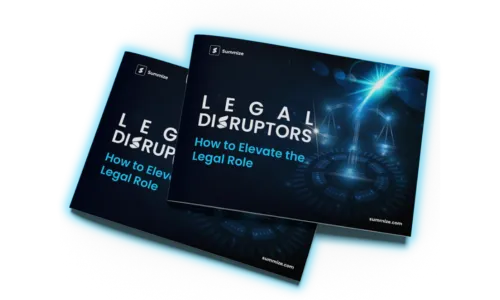Summize's offering and plan for growth
Richard Somerfield, CTO at Summize, talks about his journey to Summize and the business' plan for growth over the next few years.
August 31, 2022
December 19, 2025
The latest episode of Tact Talks features a conversation with Summize's Chief Technology Officer, Richard Somerfield, whose career spans early home computing, R&D engineering, and now leading product and technology at one of the UK’s fastest-growing legal tech companies. The discussion traces how Summize evolved from a simple contract summarisation tool into a full contract lifecycle platform, and what it really takes to build software that lawyers will actually use.
A career built on curiosity
Richard’s interest in technology began early, thanks to his father’s IT job and an Amstrad computer that left little choice but to experiment.
“If you wanted the computer to do anything, you had to start typing.”
That early curiosity shaped his engineering mindset: peel back layers, understand how things work, and build from first principles. After studying computer science at the University of Manchester, he moved through roles in telecoms, R&D, and product innovation, often creating proof-of-concepts and early-stage ideas, almost like running mini-startups inside larger organisations.
Why Summize?
Before joining, Richard already knew Summize’s founders, Tom Dunlop and Dave Smith. Tom, then a General Counsel, had been repeatedly asked to extract data from hundreds of contracts, often with slightly different criteria each time. By the third round, frustration turned into innovation, and he began working with Dave to automate the process.
Richard saw an industry still at the start of its digital transformation. Legal, in his words, was “a few years behind FinTech,” which meant the opportunity for rapid improvement and real impact was huge.
From summaries to the full contract lifecycle
Summize initially focused on contract summarisation. But when Richard joined he pushed the team to zoom out:
“If a summary is the outcome, what happens before that? And what happens after?”
This thinking expanded the product into a broader platform, covering:
- Contract creation with guided templates for business teams
- Negotiation inside Microsoft Word, where lawyers already spend their time
- Intake workflows in Teams and Slack that gather context automatically
- Post-signature analytics to identify trends, risks, and negotiation patterns
One of the most loved features today, the intake workflow, is a great example of solving a simple, universal pain point. Instead of ambiguous emails like “Can you review this?”, Summize asks structured questions so legal finally receives the detail it needs upfront.
Engineering as a product discipline
A major theme in the conversation is how Richard views the role of engineering in a modern tech company. He emphasises that Summize doesn’t hire traditional “code-only” developers.
Engineers talk to customers, contribute to product decisions, and work directly on shaping outcomes rather than waiting for a long list of requirements. It’s agile in practice, not just in process.
Leadership, culture, and working style
Richard’s leadership style blends hands-on involvement with a focus on collective problem-solving. He encourages teams to avoid groupthink, questions comfortable assumptions, and prefers leading from within the team rather than above it.
Summize also embraces a flexible hybrid model. Creative work often happens in the office; deep-focus engineering work is typically remote. During the pandemic, the company even doubled its monthly feature output, a reminder that fewer distractions and no commute can dramatically boost productivity.
Explore the full conversation and learn from Richard's expertise by listening to the full podcast at the start of the blog and hear more insights from the team in our range of articles.
Discover even more!
Explore more about contracting and CLM in our ultimate contract guides








